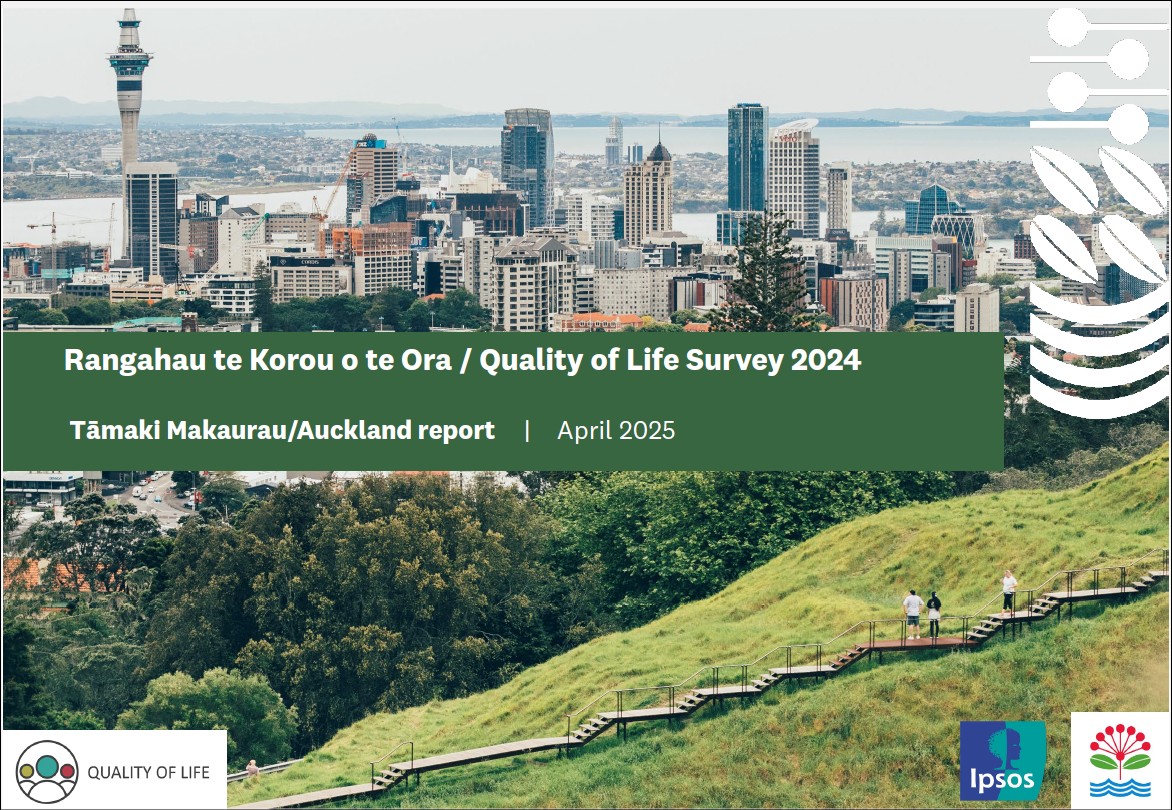Quality of Life Survey 2024: Tāmaki Makaurau / Auckland Report
Author:
Trudie Cain, Ashleigh Prakash, IpsosSource:
Auckland Council Strategic Advice and Research Unit, IpsosPublication date:
2025Topics:
PeopleRangahau te Korou o te Ora. Quality of Life Survey 2024. Tāmaki Makaurau / Auckland Report. April 2025
Extracts
The Quality of Life Project is a partnership between nine New Zealand councils. It measures urban residents’ wellbeing and their perceptions of living in large urban areas. This report presents
results from the 2524 Auckland respondents who took part in the 2024 survey.
Background
Rangahau te Korou o te Ora / The Quality of Life Project is a collaborative local government research project in Aotearoa New Zealand.
The project was established over 20 years ago, in response to the impacts of urbanisation on the wellbeing of New Zealand residents and communities. The primary objective of the study is to measure urban residents’ wellbeing and their perceptions of living in large urban areas, through a survey undertaken once every two years.
The survey provides data for councils across the country to use as part of their monitoring programmes, and to make important decisions that aim to improve life for residents and communities.
It also contributes to public knowledge and research on wellbeing issues in New Zealand.
Councils involved
The number of participating councils varies each time. In 2024, nine councils participated in the Quality of Life survey:
- Auckland Council
- Hamilton City Council
- Tauranga City Council
- Hutt City Council
- Porirua City Council
- Wellington City Council
- Christchurch City Council
- Dunedin City Council
- Waikato Regional Council.
The Auckland region includes several smaller towns, rural, and semi-rural areas. However, over 90 per cent of the Auckland population lives in the urban area.
Project management
Since 2012, the Quality of Life Project has been managed by a group comprising representatives from the following four councils: The Quality of Life project team manages the project on behalf of all participating councils. This includes commissioning an independent research company and working closely with the company. Ipsos New Zealand was commissioned to undertake the 2024 survey on behalf of the participating councils.
- Auckland Council
- Wellington City Council
- Christchurch City Council
- Dunedin City Council.
The Quality of Life project team manages the project on behalf of all participating councils. This includes commissioning an independent research company and working closely with the company.
Ipsos New Zealand was commissioned to undertake the 2024 survey on behalf of the participating councils.
Quality of Life survey results are available on the Quality of Life website: https://www.qualityoflifeproject.govt.nz/
Auckland Council technical report, TR2025/3
April 2025
*****
See also
Our Auckland
Auckland insights from the 2024 Quality of Life survey
Extract
... While three-quarters of Aucklanders rated their quality of life positively, the latest results have revealed wide variations in outcomes across Auckland by geographical area, ethnicity, and age.
Urban South Auckland-based respondents were less likely than respondents in north and rural Auckland to report their quality of life positively, as were Māori and Pacific respondents, when compared with other ethnic groups. Older Aucklanders, aged 65 and over, tended to report higher perceptions of their quality of life.
Housing affordability
Just one-third of Auckland respondents agreed that their housing costs were affordable. Young people aged 18 to 24, those living in South and East Auckland, and those who identified with an Asian ethnic group were least likely to agree their housing costs were affordable.
Issues of concern
Issues such as people begging, alcohol and drug-related anti-social behaviour, and people sleeping rough were viewed as issues of concern by many Aucklanders. Respondents living in southern parts of the city and those who identified as Pacific were more likely to view each of these issues as concerning, while those aged 65 and older were less likely to view them this way.
Meanwhile, those living in northern and eastern parts of Auckland were more likely to appreciate the look and feel of their local area, and more commonly thought their local area was a great place to live.
Social wellbeing
Despite these differences, Auckland respondents across different geographical areas, age and ethnicity groups reported a high level of social wellbeing. Around three-quarters agreed that the neighbourhood and home they lived in suited the needs of everyone in their household. More than eight out of ten respondents felt they had someone they could turn to for practical and emotional support during a difficult time, and three-quarters had participated in a social network or group in the previous year.
Significantly, two-thirds (67 per cent) of Auckland respondents felt accepted and valued for their identity (a 19 per cent increase since 2022), and eight out of ten (79 per cent) agreed they felt comfortable dressing in a way that expresses their identity in public, an increase of 9 per cent since 2022. ...
Quality of life survey 2024. Topline report
